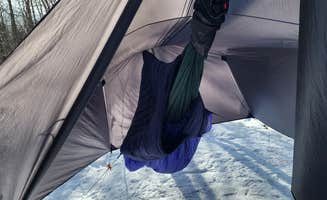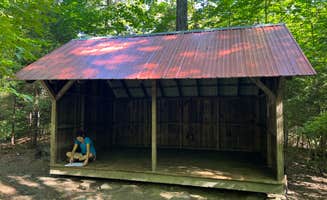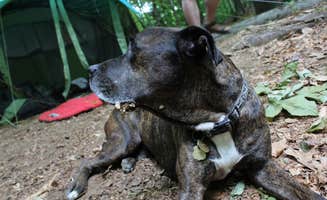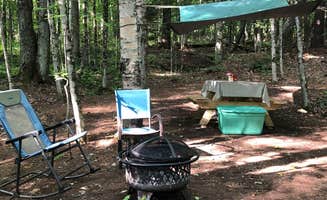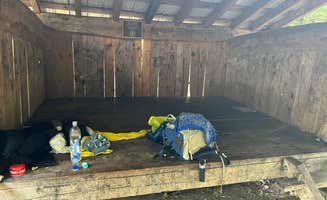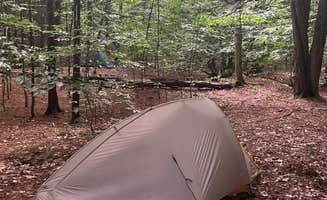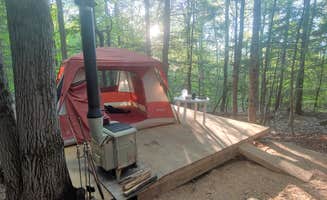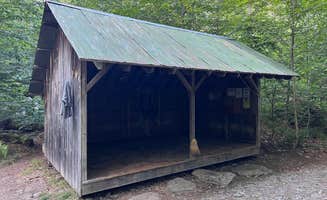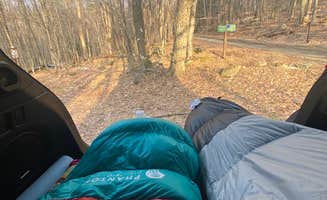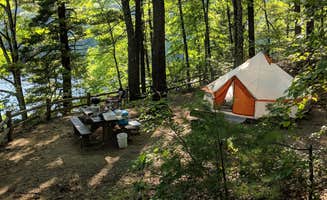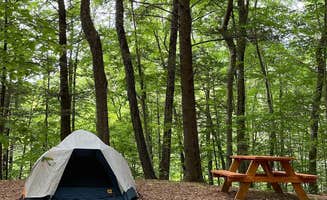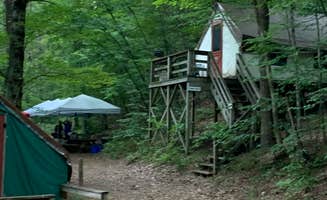Tent camping near Charlestown, New Hampshire offers access to both the Green Mountains and Connecticut River Valley ecosystems, with elevations ranging from 400 to 2,200 feet throughout the region. The area experiences distinct seasonal transitions, with summer overnight temperatures typically between 50-65°F and frequent afternoon thunderstorms in July and August. Local campgrounds span from primitive backcountry shelters to walk-in tent sites with varied amenities.
What to do
Paddle Tully Lake: Located approximately 35 miles southwest of Charlestown in Royalston, MA, Tully Lake Recreation Area offers canoe and kayak rentals for water exploration. "We take our canoe and spend the whole day at the lake. You can find lots of private areas to swim, pick blueberries and relax," notes camper Ben P.
Hike to waterfalls: Several cascades within a 30-minute drive provide shorter hiking options suitable for day trips from your campsite. "If you'd like to hike with children, there is an easy hike close to the entrance, along Doane's Falls, a series of 5 waterfalls along an ascending path through a wooded area," writes camper Jean C.
Swim in mountain ponds: Vermont's backcountry water bodies offer refreshing swimming spots during summer months. At Little Rock Pond Group Camp & Shelters, "The pond is surprisingly warm for its altitude and it's home to two Common Loons. Water is available at a creek and a spring nearby. There's a huge jumping rock on the far side of the pond," shares Meredith C.
What campers like
Secluded camping options: Many tent sites in the region provide genuine seclusion with little to no vehicle traffic. At Tully Lake, "The sites are spacious and though there is not a bad site, some are better suited for certain purposes like group camping. Each site has a table and a fire ring."
Wilderness immersion: Tent camping along segments of the Appalachian Trail offers deeper wilderness experiences. At Stratton Pond Shelter, one camper experienced "Cold, Snow, Wind, full moon in the middle of the woods with only the people I hiked in with. It was great! The shelter is a 3.75mi hike from the nearest parking lot in winter."
Car-free camping environment: Several campgrounds utilize cart systems rather than allowing vehicles at sites. "No cars at all at the campsites, which was great for peace of mind as our toddler roamed around. It also made for a super quiet stay," notes Megan G. about her experience at Tully Lake.
What you should know
Limited cell coverage: Most tent camping areas have minimal or non-existent connectivity. "Cell coverage is pretty close to absent or poor in most of the area, so download any maps you might want (driving, trail, geocaching) before you arrive," advises Jean C.
Water availability varies: Many backcountry tent sites have seasonal or unreliable water sources. At Winturri Backcountry Shelter, "Water was running when I was there in mid-August from a spring close to the shelter," though this camper notes the shelter "doesn't have consistent water."
Toilets range from primitive to modern: Bathroom facilities vary significantly between campgrounds. At Thistle Hill Backcountry Shelter, one camper reports "a decent privvy" while established campgrounds like Tully Lake offer "flush toilets as well as coin operated, hot showers, open 24/7."
Reservation timing matters: Popular tent sites book quickly during peak season. "The sites fill up weeks out (and can completely fill the day registration opens, which is date-dependent each year...Booking for Memorial Day meant I booked in April), so you have to be on your game," advises Kris M.
Tips for camping with families
Choose walk-in sites for safety: Cart-in tent campgrounds provide traffic-free environments ideal for families with young children. "The campground is perfect for peace of mind as our toddler roamed around. It also made for a super quiet stay," reports a parent who camped at Tully Lake.
Pack light for walk-in sites: Minimize gear for campgrounds that require portaging. At Tully Lake, "the trails can make hauling carts tough. Keeping gear to a minimum is a good idea," suggests Miguel B.
Consider nearby amenities: Maple Ridge Farm offers family-friendly facilities within a private setting. "They have a common room that has games and eggs for sale. Toilet and shower were very clean. Very lush campground, plenty of space and privacy between sites," notes Les R.
Plan for weather changes: New Hampshire's weather patterns can shift rapidly, particularly in spring and fall. At higher elevation sites, temperatures can drop significantly after sunset even during summer months, requiring proper layering for children.
Tips from RVers
Use tent platforms at backcountry sites: Several Appalachian Trail shelters offer wooden platforms that keep tents elevated from wet ground. At Velvet Rocks Shelter, a camper notes that while "tent camping here was ok," there were "some slightly slanted spots around the main shelter area," suggesting platforms offer more level sleeping surfaces.
Consider glamping alternatives: For those wanting tent camping with additional comforts, several sites provide elevated camping experiences. At Lost Boys Hideout, "Nice new tents provided at Sleepy Hollow site. Improvements to the firepit, area all mulched, even some games and water are provided!" shares Steve K.
Pack for temperature fluctuations: Evening temperatures in the Charlestown region can drop significantly, especially at higher elevations. Backcountry shelters provide wind protection but minimal insulation, requiring proper sleeping gear rated for temperatures 10-15 degrees below forecast lows.


